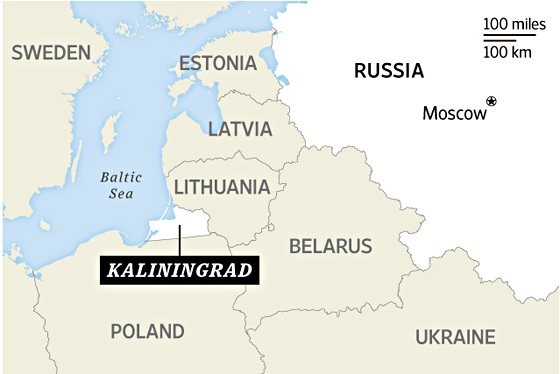 The constant provocations by the US and NATO in the Baltic region have led to a Russian response – the strengthening of its military in the westernmost region of the Russian Federation, Kaliningrad. Following the deployment of the 5th Army Corps of the US Army in neighboring Poland, a new unit in Kaliningrad was established. Lithuania is responding to the strengthening of Kaliningrad by intensifying joint military exercises with allies near the borders of Russia.
The constant provocations by the US and NATO in the Baltic region have led to a Russian response – the strengthening of its military in the westernmost region of the Russian Federation, Kaliningrad. Following the deployment of the 5th Army Corps of the US Army in neighboring Poland, a new unit in Kaliningrad was established. Lithuania is responding to the strengthening of Kaliningrad by intensifying joint military exercises with allies near the borders of Russia.
The Lithuanian and US military have been conducting exercises in forest conditions and training in guerrilla warfare tactics in small groups. Specialists of the 8th Cavalry Regiment of the US Army trained Lithuanian units to develop tactics and organize forest ambushes. It is believed that a small group of military personnel will be able to stop Russian tanks from progressing in forest conditions in a hypothetical war.
On March 3, a US strategic B-1B bomber flew over the Lithuanian capital of Vilnius, accompanied by two Italian Eurofighter Typhoon jets, and patrolled NATO airspace in the Baltic region. The flight was coordinated by the Lithuanian Armed Forces and the US Special Operations Forces. On the same day, a similar demonstration of NATO’s strategic power took place in Latvian and Estonian airspace, and had the participation of Danish and Swedish fighter jets. Over the past three years, more than 200 American strategic bombers have conducted exercises in Lithuanian airspace.
There is little doubt that the B-1B’s activity was aimed at Russian air defense systems, particularly those in Kaliningrad. In this context, the US State Department supports the strengthening of military cooperation with the Baltic States. US Ambassador to Lithuania, Robert Gilchrist, and the Commander of the US Air Force in Europe and Africa, General Jeffrey Harrigian, emphasized their determination to militarily support Lithuania. Captain Evan Ringel, the commander of the American unit in Lithuania, noted last month that although "the Lithuanians may have fewer tanks and troops, they know how to work with what they got" and "what they lack in numbers, they make up for in unconventional warfare tactics." Although the US claims that it has a commitment to Baltic security, they are using this guise to justify the transfer of over half a billion dollars’ worth of equipment from the US in the past five years.
However, the appearance of a new motorized rifle division in Kaliningrad is Moscow’s response to increasing US and NATO military activity in the Baltic region. The 152nd Missile Brigade in Chernyakhovsk was re-equipped with the Iskander-M missile system and the Baltic Fleet Coastal Army has received the S-400 air defense system, as well as the Bal and Bastion anti-aircraft missile systems. There also at least 12,000 Russian troops. The division is deployed over a large area and can carry out a wide range of combat missions in cooperation with the Russian Western Military District.
It is no coincidence that the former commander of the Polish Land Forces, General Waldemar Skzipchak, is sounding the alarm, saying last week that "In case of war [with Russia], we will need 400,000 soldiers or more. Poland cannot afford to have so many professional soldiers. Thus, 70% are reserve soldiers who will be called up only in case of war. But who should we count on?"
Skzipchak also noted that Poland is a NATO cover country and in the event of a war, it is Poland that will be the first to take a strike among all NATO countries.
During a recent press conference, US Ambassador Gilchrist stated that his country is committed to Lithuania’s security but avoided answering a question about the possibility of a permanent presence of American troops in the Baltic country. On the one hand, although the US is verbally saying it is committed to Lithuania, it appears Washington is unwilling to put American troops at risk. It is for this reason that the US assists Lithuania with military training and provides equipment, but will not go beyond this with a permanent troop presence.
This again demonstrates that Lithuania, the other Baltic states and Poland are merely being used by Washington as tools of antagonization against Russia. At the same time, Washington is unwilling to put US troops at risk while it happily puts European soldiers in danger. Not only are the Baltic States and Poland being used as European points of pressure against Russia, but it will be their own soldiers – in a hypothetical war – that will have to face the Russian military while the US remains at a safe distance. It would be expected that these European states would realize they are being used to enact Washington’s interests without any benefit to their own citizens. In fact, decisionmakers in Poland and the Baltics only further impoverish their citizens by increasing the military budget instead of building economic recovery in the post-pandemic period, whilst simultaneously ensuring that rapprochement with Moscow is impossible.
Paul Antonopoulos is a research fellow at the Center for Syncretic Studies.


